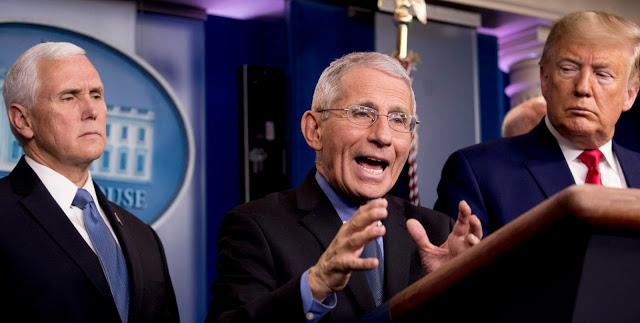‘Only in our anti-truth hellscape could Dr. Anthony Fauci become a super-villain,’ says headline on Washington Post column

By Margaret Sullivan
The Washington Post
Right-wing commentators are pretending that thousands of newly released emails from Dr. Anthony S. Fauci represent some kind of smoking gun against the government’s top infectious-disease expert, whom they have recently decided to try to destroy.
I haven’t been nearly as excited by the emails, which are mostly full of mundane correspondence. But there’s at least one line in them that stands out.
“I genuflect to no one but science and always, always speak my mind when it comes to public health,” the normally even-tempered scientist wrote in March of last year, to an epidemiologist who had accused a number of public health officials of appeasing the science-challenged President Donald Trump.
At 80, Fauci has served in Republican and Democratic administrations since the Reagan era. And until recently, he has garnered widespread respect. The reason is in that email: He’s really not a political animal, but someone who is all about the science. For decades, that has served him well. But not anymore.
These days, the director of the National Institute of Allergy and Infectious Diseases is the right’s latest excuse for outrage-mongering.
Rep. Elise Stefanik of New York wants Fauci fired immediately. Sen. Josh Hawley of Missouri expressed shock at the supposed revelations in Fauci’s emails and called for a full congressional investigation. Tucker Carlson wants a criminal investigation. His Fox News colleague Steve Hilton claimed last weekend that Fauci lied to Congress about ties between a Chinese lab and the Obama administration. And the fringe Gateway Pundit website published a story blaming Fauci for millions of deaths. It featured a deranged headline that recalled the fake miracle cures for covid-19 that Trump used to tout: “They CONSPIRED to Disqualify Hydroxychloroquine as a Covid treatment.” (Editor’s note: Sen. Rand Paul has also been a leading public critic of Fauci, going back months. Rep. Thomas Massie has co-sponsored the “Fire Fauci Act” and accused him of hiding and skewing data.)
But the campaign against Fauci has dramatically intensified recently — especially since BuzzFeed and the Post released his email trove last week.
And in a twisted way, it makes sense. After all, today’s right-wing politics and media require a villain. With solid approval ratings and an apparently indelible reputation as a moderate, President Biden isn’t turning out to be much of one. Vice President Harris? A little more promising given how much some trolls enjoy race-baiting, but still a less-than-ideal target.
But Fauci is a different story. He established himself as an annoyance to Trump early in the pandemic, when he was forced to publicly correct the president’s many dangerous assertions about the disease.
In a right-wing culture so often opposed to verifiable reality, who better to target than a person who stands for science and facts?
“During the Trump administration, many on the right unfortunately learned the lesson that they could make up almost anything and people would believe it,” said Laura Helmuth, editor in chief of Scientific American (and a former colleague of mine at the Post). “But science is a challenge to that.”
Which makes someone like Fauci, who genuflects only to science, a real problem and an ideal target. At times, he has been left vulnerable by his devotion to the scientific data at hand, which is never perfect or complete.
Fauci was wrong when he advised against routine mask-wearing early in the pandemic. And he may prove to be wrong about his belief that the virus originally spread to humans from a wild animal, rather than because of a Chinese government lab leak. He says he’s keeping an open mind — waiting for more data.
But let’s be clear. There’s very little in the released emails that’s shocking, other than the immense patience with which Fauci politely and helpfully responded to thousands of emails, many from strangers.
When CNN’s John Berman brought up his errant guidance on mask-wearing, Fauci said that he did the best he could with the limited knowledge he had. Would he have offered different advice given what we now know about asymptomatic transmission of the virus and about the effectiveness of masks?
“Of course,” he responded, with a touch of exasperation. “That’s so obvious.”
Is it entirely logical, in a culture intent on rejecting facts, that a career public servant devoted to science should be under vicious attack?
Of course. That’s obvious, too.